The government encourages foreign investment, particularly joint ventures with Qataris. As long as a company has a local agent or sponsor, Qatari law permits fully foreign-owned companies. Foreign-owned firms and the foreign-owned portions of joint ventures are subject to taxes of 5 percent to 35 percent of net profits. Qatari and GCC nationals and business concerns are exempted from the income tax provisions.
Foreign investors are forbidden from expanding investments beyond legal limits unless approved by Emiri decree. Transfer of technology, management and marketing, as was the case in establishing steel, fertilizers and petrochemical industries in the 1970s, were taken as part of the foreign equity (20 or 25 percent).
Privatization
Although Qatar has implemented a privatization policy, it will not become fully effective until the country revises laws relating to foreign investment in business associations. The establishment of the stock exchange is expected to facilitate privatization. As mentioned, the first significant privatization of a state-owned enterprise occurred in December 1998, when 45 percent of the telephone provider Q-Tel was offered to the public.
Stock Exchange
The Doha Stock Exchange (DSE) was established in 1995 under law no. 4/1995. This law regulates securities transactions, such as bonds and shares of Qatar shareholding companies, government or quasi-government (bonds and negotiable instruments and other securities which are authorized for trading). The DSE is an autonomous entity indirectly overseen by the Finance, Economy and Trade Ministry.
Operations began in the first quarter of 1997. Currently, only Qatari nationals can participate. The exchange membership includes the Qatar Central Bank and all licensed commercial banks. Several trading activities are limited to brokers, and there are licensing rules applicable to brokers.
It was officially disclosed that in the second year of the stock exchange's operation (1999), the value of traded stocks grew by 162.5% to QR 1.3 billion, compared to QR 500 million in the first year. The market value of stocks increased by 100% in the first year to QR 12 billion, and by 60% in the second year, reaching QR 19.4 billion. A total of 30 companies reportedly trade on the stock exchange. (QR3.64=$1).
Leading Growth Sectors
The contribution of non-oil sectors to GDP usually ranges between 63 to 69 percent. Agriculture and fishing, electricity and water, building and construction, and communications have all increased their share of GDP while manufacturing industries and services have decreased.
Since the early 1960s, foreign participation in the Qatari market primarily consisted of providing a wide range of products, including automotive and spare parts, as well as oil field supplies. More recently, however, American technology, products and services are being imported into fields, such as electricity and water, oil and natural gas development and enhancement of recovery of these resources.
Major Projects
The Ras Laffan field and other liquefied natural gas (LNG) and hydrocarbon projects have attracted billions of dollars in foreign investment.
Qatar has also been working on a $18 billion phased project to improve and develop its gas production and export infrastructure as well as boost crude oil exports. Phase 2 of involves constructing a gas liquefaction plant and port at Ras Laffan by state-owned Qatargas.
A recent Qatari banking study revealed that the overall investment in local gas liquefying projects is estimated at $8.5 billion. These projects are presumed to overcome the current financial difficulties and to stimulate economic growth. This study, which was prepared by the Qatar National Bank, showed that these investments consist of establishing two gas liquefying projects in the North field, in addition to building a seaport to ship LNG to external markets. The total production capacity of both projects is estimated at 11m t/y, most of which will be exported to Japan and other Asian markets. These projects are being implemented by Qatargas, Rasgas, in addition to the Ras Laffan Port. This port, which costs $1 billion, will serve Rasgas, and will commence production in 2000.
The city of Doha will be faced with a 400 Mw power shortfall in the next couple of years if no additional generating capacity is installed. As a result, the state-owned Qatar General Petroleum Company (QGPC) has proposed to undertake the Ras Laffan independent water and power project. In doing so, QGPC in September 1999 awarded a letter of intent to Germany-based Electrowatt Engineering Services regarding a consultancy contract for the agreement.
Project Finance
To drive its infrastructure expansion plans, Qatar regularly taps the international money markets. Even though the national debt is equivalent to 77 percent of GDP, international financiers are still lining up to lend substantial sums.
At the end of March 1999, the Qatari government faced an aggregate debt burden of $6.4 billion, or 69.4 percent of nominal GDP. Of this total, $3.4 billion was in the form of internal debt and $3 billion constituted external obligations. The increase in Qatar's internal government debt during the past year was caused primarily by an expansion in short-term debt (where maturity is under 12 months), which offset a reduction in medium-term debt (with a maturity between 1-7 years).
Following Law No. 1 of 1998 for Public Debt, Qatar's Central Bank is now authorized to issue treasury bills and government bonds on behalf of the government. To date, there are no detailed proposals for the issuance of either treasury bills or government bonds, but such a move would provide the Central Bank with an additional tool for managing domestic liquidity. Since 1994, the government's total debt has risen by 120 percent.
The majority of Qatar's external debt has accrued to finance its budget deficit and for infrastructure projects. Moreover, the Qatar General Petroleum Corporation (QGPC) and its subsidiaries incurred much indebtedness to finance the development of LNG projects and other industrial enterprises. While some of these obligations have received government guarantees, QGPC has provided its own guarantees for the obligations of relevant subsidiaries, up until the project's completion date.
Qatar enjoys high credibility in the international markets because of its impressive portfolio of project financing deals over the past number of years. Its economic prospects over the medium-to-long term are bright, given the revenue forecasts for Qatargas and Rasgas.
Distribution and Sales Channels
The Government of Qatar is presently in the process of significantly modifying the current laws and regulations that relate to the marketing of foreign goods and services in the Qatari market. The modifications will ease restrictions on local agent/sponsor clauses and foreign equity participation and foreign investments in certain sectors.
Foreign firms interested in marketing their products and services in Qatar must adhere to provisions of Law No. 4 (1986), which deals with local agency arrangements, and Law No. 25 (1990), which relates to foreign equity participation. Each of these laws outlines the necessity of having a local agent or representative as a sales channel for distributing goods and services in the Qatari market.
Use of Agents/Distributors
Local agents or representatives must be a Qatari citizen or a company with at least 51 percent Qatari ownership. Only a holder of an import license may import goods for sale in Qatar. Changing a local agent or representative is both a difficult and time-consuming process.
Therefore, selection of agents should be given serious consideration. An effective agent in Qatar will have extensive contacts in both the government and private sectors, thus enabling him to obtain valuable information on upcoming government tenders. A local agent should possess the ability to introduce products or services of his foreign supplier to key government officials.
It is common practice in Qatar and other Gulf States to appoint an exclusive agent or representative as a sales channel. This practice may, however, involve some risk in the case of services, and foreign firms are thus advised to choose local agents for their services on a project-to-project basis, since a local representative may be well connected in several specific areas. Foreign firms are also advised to avoid appointing one regional agent for a number of countries. Qataris prefer to meet senior officers of foreign firms, and believe that the amount of interest displayed by a foreign firm through frequent visits can ultimately make the difference between winning or losing a major contract.
Local agency law prohibits the importation and sale of brand name food products by anyone other than the principal agent. In the case that a local agent increases his prices or fails to stock certain items, such as spare parts, the Ministry of Finance, Economy and Commerce is entitled to authorize importation of these products to a local merchant or company other than the designated agent.
Establishing an Office/Joint Venture
The Qatari Government has not yet promulgated a branching law that allows establishment of a wholly owned branch of a foreign firm in the local market. The local agent requirement applies to foreign firms wishing to establish a branch in Qatar for a foreign parent company, as well as to those foreign firms entering into a joint venture on the basis of up to 49 percent foreign equity. The foreign firm and local agent should apply for official registration of the agency, joint venture or branch office with the Ministry of Finance, Economy and Commerce's Commercial Registration Department.
The establishment of a majority or wholly owned firm in Qatar is extremely rare, and has generally been restricted to firms and specific development projects in the oil and gas sector. Such arrangements can only be made by the issuance of a ministerial decree, after a judgment that the foreign firm brings technical expertise or financial assets that are unavailable in Qatar. A local agent is still required for such arrangements.
Until mid-1995, Law No. 25 (1990) stipulated that the above-mentioned decree should be issued by the country's Emir. This law was modified and the right to issue the decree was allocated to the Minister of Finance, Economy and Commerce. The aim of this amendment was to hasten the establishment of foreign enterprises.
Best Business Prospects
Rank Sector
1 Machinery and Transport Equipment
2 Manufactured Goods Classified Chiefly by Materials
3 Miscellaneous Manufactured Goods
4 Food and Live Animals
5 Chemicals and Related Products
6 Beverages and Tobacco
7 Inedible Crude Materials, Except Fuel
8 Mineral Fuels, Lubricants and Related Materials
9 Animal and Vegetable Oils; Fat and Waxes
10 Others
© 2000 Mena Report (www.menareport.com)







